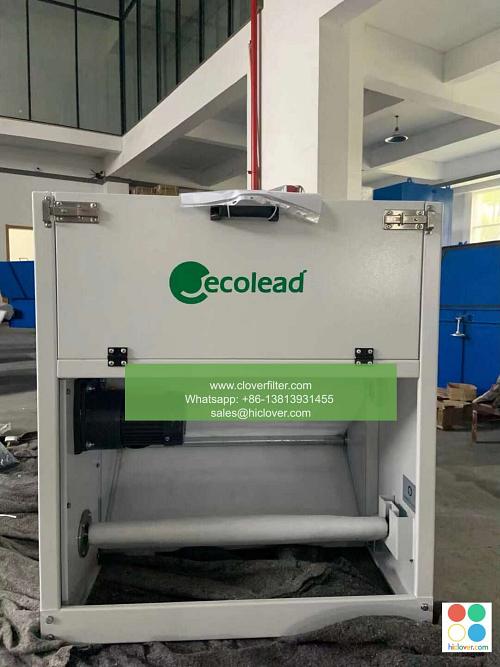Calgary Food Processing Workshop: The Importance of Automatic Roll Air Filters

The Calgary Food Processing Workshop is an annual event that brings together industry experts, manufacturers, and food processing professionals to discuss the latest trends, technologies, and best practices in the food processing industry. This year’s workshop focused on the importance of air filtration in food processing and the benefits of using automatic roll air filters. In this article, we will discuss the key takeaways from the workshop and the significance of automatic roll air filters in the food processing industry.
Air filtration is a critical component of food processing as it helps to remove contaminants, allergens, and other airborne particles that can affect the quality and safety of food products. The use of automatic roll air filters is becoming increasingly popular in the food processing industry due to their effectiveness, efficiency, and cost savings. These filters are designed to capture 99.97% of particles as small as 0.3 microns, making them ideal for use in food processing applications where high levels of air quality are required.
One of the key benefits of automatic roll air filters is their ability to reduce labor costs and minimize downtime. Traditional air filters require regular maintenance and replacement, which can be time-consuming and labor-intensive. Automatic roll air filters, on the other hand, are designed to automatically roll out a new filter media as the old one becomes dirty, reducing the need for manual intervention and minimizing downtime. This results in significant cost savings and increased productivity for food processing facilities.
Another benefit of automatic roll air filters is their ability to improve indoor air quality and reduce the risk of contamination. By capturing airborne particles and contaminants, these filters help to prevent the spread of bacteria, viruses, and other microorganisms that can affect the quality and safety of food products. This is particularly important in food processing applications where high levels of air quality are required to prevent contamination and ensure the safety of consumers.
The Calgary Food Processing Workshop also highlighted the importance of selecting the right air filter for specific food processing applications. Different types of air filters are designed for different applications, and selecting the wrong filter can result in reduced efficiency, increased costs, and compromised air quality. The workshop provided guidance on how to select the right air filter for specific applications, including considerations such as air flow rates, particle sizes, and filter efficiency.
In addition to the benefits of automatic roll air filters, the workshop also discussed the importance of regular maintenance and testing of air filtration systems. Regular maintenance and testing help to ensure that air filtration systems are functioning properly and effectively removing airborne particles and contaminants. The workshop provided guidance on how to perform regular maintenance and testing, including checks on filter efficiency, air flow rates, and pressure drops.
The use of automatic roll air filters is also becoming increasingly important in the food processing industry due to changing regulations and standards. The food processing industry is subject to strict regulations and standards, including those related to air quality and filtration. The use of automatic roll air filters helps food processing facilities to comply with these regulations and standards, reducing the risk of non-compliance and associated penalties.
In conclusion, the Calgary Food Processing Workshop highlighted the importance of automatic roll air filters in the food processing industry. These filters offer significant benefits, including reduced labor costs, improved indoor air quality, and increased productivity. By selecting the right air filter for specific applications and performing regular maintenance and testing, food processing facilities can ensure high levels of air quality and comply with changing regulations and standards.
Conclusion: The Calgary Food Processing Workshop provided valuable insights into the importance of air filtration in the food processing industry and the benefits of using automatic roll air filters. As the food processing industry continues to evolve, the use of automatic roll air filters is likely to become increasingly important for ensuring high levels of air quality, reducing costs, and improving productivity.
Frequently Asked Questions (FAQs)
Q: What are automatic roll air filters and how do they work?
A: Automatic roll air filters are designed to capture airborne particles and contaminants, automatically rolling out a new filter media as the old one becomes dirty.
Q: What are the benefits of using automatic roll air filters in food processing applications?
A: The benefits of using automatic roll air filters include reduced labor costs, improved indoor air quality, increased productivity, and compliance with changing regulations and standards.
Q: How do I select the right air filter for my food processing application?
A: Selecting the right air filter requires consideration of factors such as air flow rates, particle sizes, and filter efficiency. The Calgary Food Processing Workshop provided guidance on how to select the right air filter for specific applications.
Q: Why is regular maintenance and testing of air filtration systems important?
A: Regular maintenance and testing help to ensure that air filtration systems are functioning properly and effectively removing airborne particles and contaminants.
Q: Are automatic roll air filters compliant with food processing regulations and standards?
A: Yes, automatic roll air filters can help food processing facilities to comply with changing regulations and standards related to air quality and filtration.

